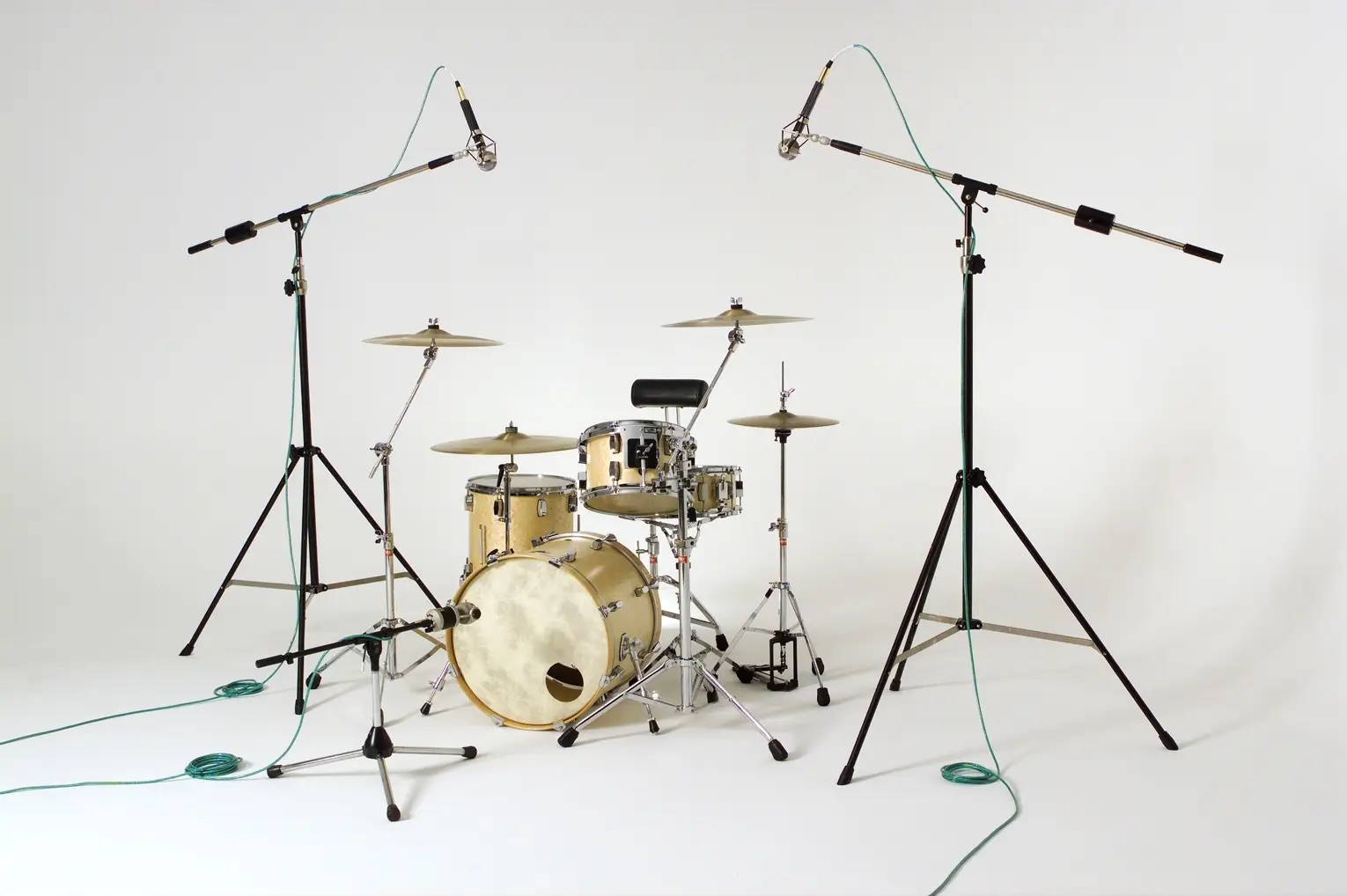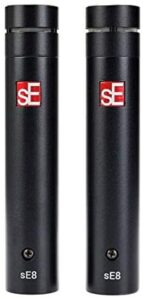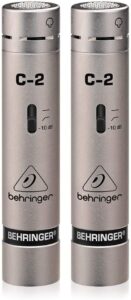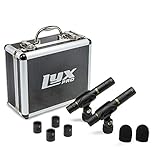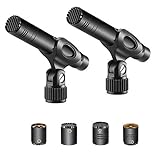If you plan to use microphones on your drum kit, overhead mics will be the best choice for it. The best overhead drum mics pick up the full sound of your kit, providing the listener with a complete picture of what you’re playing.
With that in mind, it’s critical to invest in a good set of overheads that will help them sound be more authentic. Let’s take a look at a few of the more popular options.
Overhead Mics For Drums – Top Picks
1. Rode M5 Matched Pair Cardioid Condenser
Henry and Astrid Freeman launched Freedman Electronics in 1967. Freedman Electronics grew from obscurity to prominence in the Australian audio business, eventually becoming one of the industry’s most prestigious enterprises.
After experiencing a financial setback, Freedman Electronics decided to invest in developing their own microphone range. The reputation of the company was built on this range of microphones. The M5 is an excellent example of why this manufacturer has maintained its solid reputation.
The low noise of the Rode M5 cardioid condenser microphone improves the clarity and precision of your drummers’ creative song. This microphone is regarded as one of the greatest overhead drum mics due to its high-quality sound production.
This condenser microphone has a ceramic coating that adds corrosion resistance and makes it more robust. This Rode small microphone features a wide frequency response that allows skilled musicians to record music without being distracted by background noise.
These microphones have a wide range of applications, from drums to violins, in terms of responsiveness. Many people claim that, despite their inexpensive price, they have a remarkable tonal quality.
This Rode stereo condenser mic pair is hard to go wrong with at this pricing point. The M5 is a favorite of many drummers in the community, particularly for cymbals.
Features:
- 19dBA (A-weighted) noise level
- 24V or 48V Phantom Power
- 20 to 20000 Hz
- Affordable
- 140 dB SPL
2. AKG C 214 Microphone
The AKG C 214 microphones are large diaphragm condensers with a cardioid pattern that goes from entry-level to professional grade.
If you’re unfamiliar with drum mics, you’ll notice that these are much larger than normal pencil condensers, giving the drumming more life and offering some unique characteristics.
Because the mics are factory calibrated to record in stereo, they’re ideal for usage as overhead drum microphones. They have a lot of low-end, which allows the larger toms and bass drum to have a lot of depth.
The kit’s various mid-range and higher-end frequencies sound amazing as well, resulting in a fantastic overall tone. These mics are smooth, precise, and forgiving. Because you don’t need a lot of EQ to achieve a good sound, they’ll work even if you don’t have a lot of mixing knowledge.
The fact that these mics only have a cardioid pattern is a bit of a drawback. More expensive microphones typically have various pickup patterns, making them more adaptable in their application.
Fortunately, cardioid patterns are all that are required for drum kits so that you won’t be affected too much. However, if the need comes, it will limit you in other areas.
Features:
- Large Diaphragm Sound
- Outstanding Dynamic Range
- Switchable 20 dB Attenuation Pad
- 156dB SPL
3. sE Electronics sE8
When thinking of the sE8s from sE Electronics, two things immediately come to mind: quality and value for money. These condenser microphones with short diaphragms have a superb tone that is unusual for mics in this price range. There’s also the lightning-fast record response.
The drum kit is recorded with incredible subtlety by these mics. They make your cymbals sound fantastic, regardless of how high-quality they are. That’s one of the best things about drum microphones, and it’s especially true with these.
They are also rather easy to arrange around the drums due to their compact form. Another advantage of these mics is that you could use one as a hi-hat mic, and it would pick up the sharpness ideally.
They’re a wonderful mid-range set of overheads with a lot of value and a moderate cost when compared to the value they provide.
Features:
- Gold-sputtered diaphragms
- Sophisticated acoustic design
- Class-A circuitry
- 139 / 149 / 159 dB SPL
4. AKG C1000 MK4 Microphone
Although it’s typical to utilize a matched pair of overhead microphones, you don’t necessarily need two of them. In some cases, only one overhead is required.
This could be due to a lack of room or the fact that you have a compact drum kit that doesn’t require many microphones. For these conditions, the AKG C1000 MK4 is an excellent choice.
This mic features a cardioid waveform with a small diaphragm. A hypercardioid adapter, a presence boost adapter, a -10dB pad, and a high pass filter are also included. The fact that you can use batteries for mobile use is the cherry on top of all of these advantages.
This mic will provide your drum kit with crystal clarity and a smooth sound across the medium and high-frequency ranges. Because the mic can run on batteries instead of phantom power, it’s a good choice for gigs when phantom power isn’t accessible.
Overall, if you only need one overhead, it’s a terrific choice. Given all of its capabilities, it comes in at a reasonable price.
Features:
- Gold sputtered microphone capsule
- Bass cut
- Unique polar pattern
- Powered by internal AA batteries
- 137dB SPL
5. Behringer C-2 Studio Condenser Microphones
The last item on the list is a set of low-cost overhead microphones. Despite having several high-quality items, Behringer appears to be most successful in the low-cost entry-level market.
These C-2 mics are an excellent choice for anyone who is new to drum tracking and is looking for a low-cost option.
These are cardioid-pattern tiny diaphragm condenser mics. The first thing you’ll notice about them is their miniature size. They are, in fact, the tiniest microphones on the market. As a result, positioning them is a breeze. They’re also relatively light to transport.
The raw sound produced by these mics is definitely inferior to that produced by some higher-priced mics. With some mixing technique and knowledge, though, it is possible to achieve a truly nice sound.
This is why they’re such a good microphone for newbies. They’re inexpensive, and they’ll force you to hone your EQing skills over time. If you want to use these professionally, you’ll probably need some pretty good preamps, but that’s a topic for another day.
These would be excellent choices for intermediate to advanced players. There are better microphones available. They’re great for novices and those on a restricted budget.
Features:
- 2 matched condenser microphones
- Cardioid pickup pattern
- Low-mass diaphragm
- Gold-plated 3-pin XLR connector
- 150 dB SPL
Buying Guide
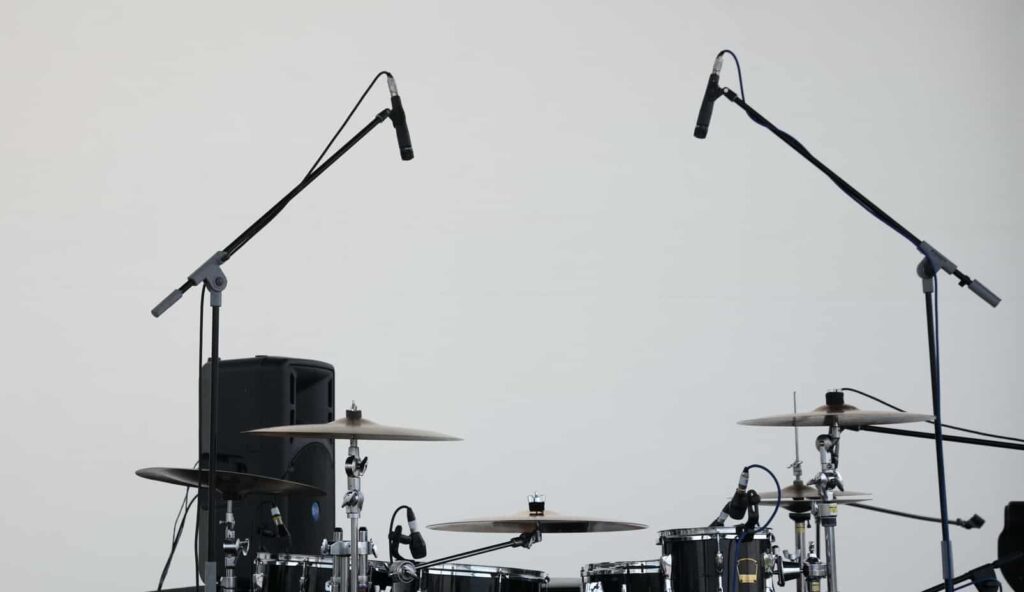
When it comes to choosing a drum microphone, what aspects should you consider? What criteria did we use to evaluate the models on this list? Before you order any drum microphones, make sure you’ve gone through the following.
Type
Condenser and dynamic microphones are the two most common types. The way they pick up sound and the mechanism employed to record within the capsule gives them their names; however, there are some significant variations between the two mics.
Understanding the differences between the condenser and dynamic microphones that can be used as drum overheads will help you prioritize.
Diaphragm
When it comes to detail, this is also an important factor to consider. Large-diaphragm condenser mics provide greater detail than small-diaphragm condenser microphones and are hence more highly recommended.
SPL Rating
When researching microphones, the term “SPL” will frequently appear in the specs. This stands for “sound pressure level,” and it indicates how loud a microphone can handle before distorting.
It’s a mechanical metric for the change in air pressure caused by noise. Aim for microphones with a high SPL rating, as these are more likely to withstand the force generated by a drum kit.
Price
Some mics are exorbitantly priced, while others are ridiculously inexpensive. High-quality microphones are much easier to work within post-production than low-quality microphones.
Professionally recorded drums are easy to mix and EQ. It won’t be as tough to get a decent drum recording as it would be if you used low-quality microphones. When shopping for overhead microphones, keep that in mind.
Matched Pair
When recording stereo sound sources like overheads, huge pianos, acoustic guitars, or field recordings, matched pairs of microphones reduce the danger of phase difficulties.
Investing in a solid pair of matched microphones reduces these risks and improves recording and mixing uniformity and predictability.
Sensitivity
The sensitivity of a microphone relates to how much of the original sound source it picks up and converts into an audio input signal for the desk or other audio input.
Because dynamic mics have a lesser sensitivity, they’re ideal for high-volume recordings because they produce a more consistent level of sound and don’t get “overloaded” as easily.
Although a highly sensitive microphone may appear to be a preferable option, mic sensitivity might be excessive in some circumstances, resulting in a variety of audio issues. Drums are loud, thus a sensitive microphone isn’t necessary.
FAQ
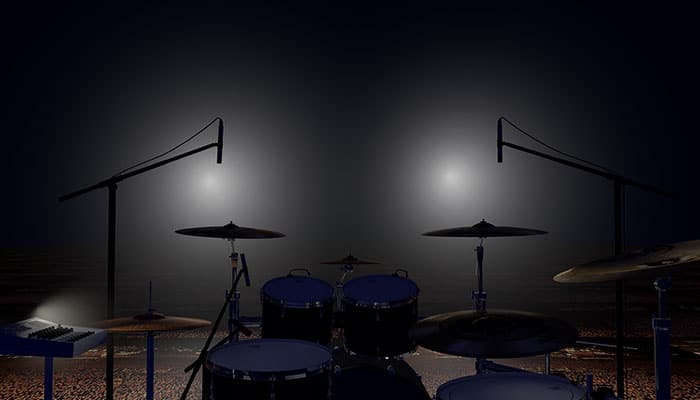
How high should overhead drum mics be?
When it comes to the height of your overhead microphones, there is no hard and fast rule. It all boils down to the size of your drum set, the volume of your drums/cymbals, and the location of the optimum equilibrium point.
Is a single overhead microphone sufficient for recording?
Yes, in some cases, a single overhead mic will suffice for recording. It’ll assist if you understand that recording with a single mic won’t provide you stereo image and will only give you a mono recording. While mixing, this can muddy things up.
In a small area, using just one overhead mic will work best, as the sound of cymbals can soon fade in a huge room. You should also be prepared to make certain to pick up concessions. Just make sure to place the mic in the center of the setup, away from any particular cymbal or drum.
You can move the mic closer to the sound if it feels too far away. While we do not recommend using only one microphone for drum overheads, it is possible to do so.
Drums are recorded using what kind of microphone?
Condenser and dynamic microphones are the two types of microphones used to record drums (or any other instrument). While both are utilized as drum overhead mics, they each have their own set of benefits and drawbacks.
Because condenser microphones are powered, they may pick up more details, resulting in higher quality. Dynamic ones, on the other hand, do not require phantom power from a music desk or batteries. In addition, they are more durable.
Is it possible to utilize overhead drum mics on other instruments?
Overhead microphones have a variety of applications. Some of these applications will be superfluous if you want to keep them positioned as overhead microphones.
They can, however, be used as overheads for orchestral or choir recordings. All of the mics on our list can be used for purposes other than drums.
How to place overhead drum mics?
Placing the microphones in the proper locations is an important part of recording drums. It’s critical to arrange them appropriately because they can make or break your drum mix.
When using overhead microphones, make sure they can pick up the full kit. For stereo recording, this is usually why people utilize a matched pair. You might not be able to get a full sound if you only use one.
The distance between the two microphones must be equal. You must also position them in such a way that you will not accidentally hit them while playing. You just spent a lot of money on them, so be cautious not to beat them up with drumsticks.
Conclusion
Every microphone manufacturer has a number of excellent products to offer. You must first determine which product is ideal for you before moving on.
The majority of studio producers have a variety of microphones for various applications. When it comes to these things, there is never a one-size-fits-all approach. So, carefully select your microphones and begin recording.
Take a look at these mics also:
- PRO-GRADE PENCIL CONDENSER MICROPHONES : Capture the finest audio details with the LyxPro SDPC-2 stereo pair, ideal for overheads, acoustic, and...
- CUSTOMIZE PICKUP PATTERNS : Three interchangeable capsules Omni, Cardioid, and Super Cardioid, allow you to tailor the pickup pattern to your needs,...
- PRECISE AUDIO CAPTURE : The stereo pair accurately captures even the Slightest subtlest nuances, ensuring high-quality recordings that faithfully...
- EXPANSIVE FREQUENCY RESPONSE : With a frequency response of 30Hz-18kHz; Sensitivity of -38dB ± 3dB (0dB=1V/Pa at 1kHz) these microphones deliver a...
- BONUS ACCESSORIES INCLUDED : Enjoy added value with two windscreens, an aluminum carrying case, and two smooth-tilt microphone clips, making this...
- 1 x D112 MKII bass drum microphone 2 x C430 for overheads 4 x D40 for snare and toms Mounting accessories
- The Drum Set Concert I professional drum microphone set provides a complete collection of mics designed to withstand even the toughest stage...
- Seven microphones and accessories come packed into a durable aluminum carrying case so you have everything you need to capture a complete drum...
- The collection features the latest version of the legendary D112 bass drum mic the compact C430 overhead mic and the popular D40 drum microphone
- Each features high maximum SPL handling and rugged metal casing to ensure great sound night after night
- Cardioid Pickup Pattern
- Gold-plated XLR connectors
- Carry Case & shock-mounted mic clips included
- Sold as stereo pair
- Samson Audio (Author)
- INTERCHANGEABLE CAPSULES THREE DIRECTIOANS: Includes cardioid, omni and super capsules for use in virtually most recording situation. You can get the...
- WIDELY USE: Widely used for recording studio vocals, acoustic, instruments, strings, horns, orchestras and choral groups, ambient instrument audio,...
- 5/8-INCH MIC CLIP AND WINDSCREEN: Clip Fits most microphone stand with 5/8-inch thread, can firmly hold your microphone in different positions. Foam...
- FOAM PADDED ALUMINUM CASE: Made of durable aluminum, ensures high durability. Foam padded inner can protect your mics and accessories from scratching....
- Three microphones included in this package.
- High sound level handling
- Transparent and dynamic signal response
- Lightweight voice coil
- KICK DRUM MICROPHONE: The D6 is an excellent choice for kick drums, featuring a frequency response of 30Hz-15kHz and a cardioid pick-up pattern that...
- SNARE MICROPHONE: Ideal for snares, the i5 has a cardioid polar pattern, a uniform frequency response of 50Hz-16kHz, and the ability to handle sound...
- TOM MICROPHONE: For dynamic sound from drum toms and congas, the D2 can accurately reproduce the warmth and punch without the muddy, indistinct "boom"...
- FLOOR TOM MICROPHONE: The D4 is perfect for low-end sounds, providing an extra "oomph" to your kick drum, bass amp, and other low instruments with its...
- OVERHEAD MICROPHONE: The ADX51 is a versatile pre-polarized condenser microphone with a cardioid pickup pattern, suitable for various applications in...
- 7-piece drum mic pack
- Features integrated clips
- Includes vinyl carrying case with strap
- KIT INCLUDES: (1)Big bass drum mic with holder, (4)Small tabour mic with holder, (2)Condenser mic with holder, (4)Drum clamp with 5/8" screw,...
- WIDE APPLICATION: NW-7 professional drum set microphone is designed especially for percussive drum, jazzy drum and other instruments. Bass drum mic is...
- WELL PERFORMANCE: Dynamic mics adopt high output dynamic element. Equipped with a linear frequency response for superior reproduction and clear sound....
- COMPATIBLE CLAMPS: Come with seven compatible mic holders, equipped with 3/8” to 5/8" screw to match with all kinds of microphone stands. And four...
- NOTE: Features standard XLR female jack with every microphone for most audio cables. Better choice to connect with your amp or other device. The cable...
- Rugged all-metal body and robust design - Withstands tough day-to-day use
- Switchable attenuation pad - For high SPL applications up to 155 db SPL
- Small-diaphragm condenser microphone for recording of overheads, percussion, acoustic guitars and other strings
- Delivers outstanding clarity and transient response
- Lightweight 1/2 inch true condenser transducer diaphragm
- Designed for acoustic guitars, stringed instruments, cymbals, hi-hats, and more
- Mic clip included
- Hi-pass filter
- Attenuator
- Two CAD CM217 microphones for the price of one

